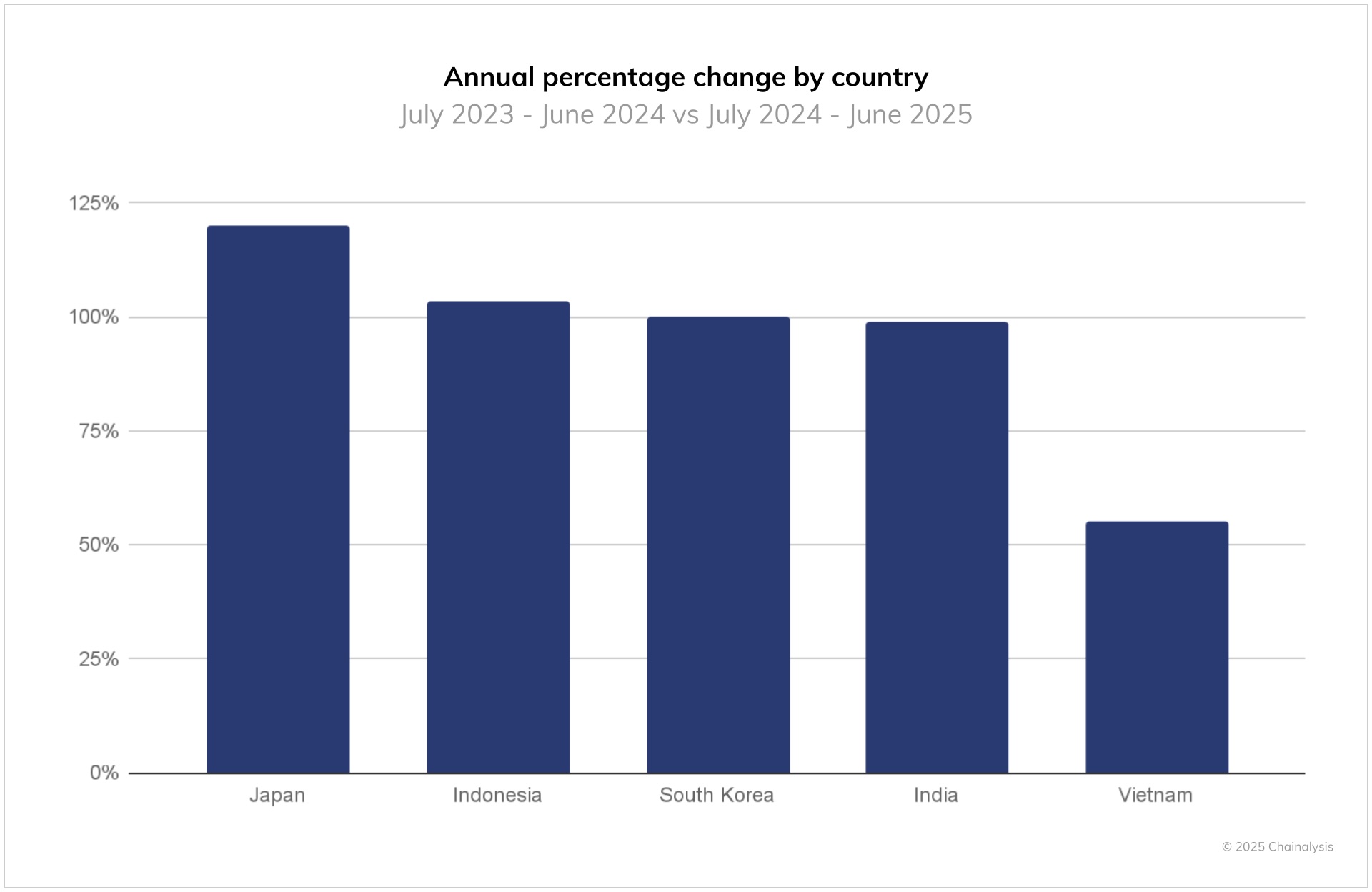Crypto in Asia Transforms Through Deals, Rules, and Reforms

Crypto in Asia keeps gaining momentum. Another busy week in the Asian crypto landscape brings fresh partnerships, policy moves and cross-border shakeups.
From Seoul to Abu Dhabi, crypto in Asia is setting new benchmarks for the cryptosphere. Here’s what transpired this week.
Trump-Backed WLFI Expands Crypto In Asia Through South Korea’s Bithumb
The South Korean crypto exchange Bithumb has partnered with World Liberty Financial (WLF), a US President Trump-linked crypto firm. The initiative aims to support the growth of decentralised finance (DeFi) worldwide.
According to the official statement released on 23 September 2025, the deal aims to explore business opportunities in the DeFi space while also securing investor confidence.
Commenting on the partnership, Bithumb CEO Lee Jae-won stated, “This collaboration with WLF will be a significant milestone in enhancing Bithumb’s global competitiveness. We will continue to strengthen our strategic network going forward.”
A memorandum of understanding (MoU) was signed at Bithumb’s headquarters in Seoul, with senior leaders from both companies, including WLF Co-Founder Zak Folkman, present at the event.
🇰🇷🚀 Big news in Korea! 🇺🇸🙏#bithumb just signed an MOU with World Liberty Financial (#WLFI) founded by Trump’s family. 🤝$WLFI, issuer of the $3B stablecoin #USD1, recently listed on Bithumb & Upbit. This partnership aims to boost global trust & unlock new business… pic.twitter.com/23yIQcFyem
— WLFI47 (@WLFI47) September 23, 2025
This partnership comes after Bithumb’s CEO, Lee, met with Eric Trump, Co-Founder of WLF and President Trump’s second son at the Hong Kong Bitcoin Asia 2025 event in August.
The two firms aim to speed up the launch and use of DeFi products. Further to this, Bithumb also mentioned that it is exploring a separate partnership with the USDC stablecoin issuer, Circle, to support its global growth plans.
EXPLORE: Next 1000X Crypto – Here’s 10+ Crypto Tokens That Can Hit 1000x This Year
India Implements Strict New Rules To Combat Rising Digital Fraud Cases
The Reserve Bank of India (RBI) has introduced new rules to make digital payments in the country more secure in the wake of rising fraud cases.
The new guidelines were released on 25 September 2025 and have mandated stricter authentication for all digital transactions in India. All banks and payment companies must implement these rules by 1 April 2025.
The updated framework builds on the existing two-factor authentication system but adds a requirement for at least one dynamic security check, including a one-time password, biometric scan or hardware token.
These dynamic security checks will change with each transaction, helping prevent credentials from being reused or stolen. These rules also apply to international payments made with Indian cards.
The Reserve Bank of India (@RBI) releases new guidelines on authentication for #digital payment transactions, set to take effect from April 1, 2026.
The framework mandates two-factor authentication for all digital payments, though no specific method is enforced.
The central… pic.twitter.com/NH7xKuMmzm
— All India Radio News (@airnewsalerts) September 25, 2025
Moreover, all authentication methods must comply with India’s Digital Personal Data Protection Act, 2023 and must function smoothly across devices and platforms.
According to the RBI, these new guidelines are designed to keep up with evolving technology while protecting users and maintaining trust in the financial system.
With the new guidelines, the RBI is encouraging companies to use smart checks based on user behaviour, extra verification and DigiLocker, a secure digital platform for storing and accessing important personal documents online.
Additionally, the RBI has also set a timeline for international compliance. By October 2026, card issuers must register their Bank Identification Numbers with global card networks.
EXPLORE: The 12+ Hottest Crypto Presales to Buy Right Now
UAE Joins Global Pact For Automatic Crypto Tax Data Sharing
The UAE has committed to global crypto tax transparency by signing an international agreement under the OECD’s (Organisation for Economic Co-operation and Development) Crypto Asset Reporting Framework (CARF).
CARF enables countries to automatically share tax-related data on crypto transactions, helping improve oversight and reduce tax evasion.
The decision was announced on 20 September 2025 by the UAE’s Ministry of Finance (MOF) to align the country’s digital asset policies with international tax standards.
According to the MOF, plans are in place to implement the framework in 2027, with the first exchange of information expected in 2028.
🚨 JUST IN: 🇦🇪UAE is implementing a Corporate Advanced Reporting Framework (CARF) to increase transparency for cross-border financial activities, including crypto and tokenized assets.
RWA hub or tax trap? Time will tell. pic.twitter.com/rPiJjeVyoK
— Real World Asset Watchlist (@RWAwatchlist_) September 22, 2025
Pre-emptively, to get ready for the new crypto tax rules, the UAE has started public consultation to hear from key players in the industry, including exchanges, custodians, traders and advisors.
The feedback window on this kicked in on 15 September 2025 and will be active till 8 November.
The UAE is one of the 50 countries that plan to adopt CARF and aims to create a global system for sharing crypto tax data. Other countries on board include New Zealand, Australia and the Netherlands.
EXPLORE: 9+ Best High-Risk, High-Reward Crypto to Buy in 2025
Crypto In Asia: Japan’s Policy Reforms See Crypto Adoption Increase by 120%
Regulatory modernisation and policy reforms have resulted in Japan posting a 120% year-over-year increase in crypto adoption.
According to Chainalysis’s Geography of Cryptocurrency Report, this growth reflects Japan’s efforts to align crypto rules with traditional finance, including the approval of its first Yen-pegged stablecoin and reduced tax burdens for crypto traders.
(Source: Chainalysis Report)
Global market trends, especially post the US election trading spikes, also influenced the surge in adoption.
While Japan’s crypto market remains subdued compared to its regional peers, Bitbank’s Chief Business Development Officer, Atsushi Kuwabara, expects upcoming policy changes to further boost crypto usage and adoption in the country.
🚨 $NETX Japan roadmap is here 🇯🇵
– Migration complete
– 219M+ tx at 15k+ TPS
– Stablecoin API + SWIFT chain coming
– Japan = Asia hub for RWA growth (+120% YoY)
– Netstars commitmentBig step from building → adoption. 🚀 #NETX @netx_world #rwa #ai #crypto @NetXJag pic.twitter.com/vbq91gYKU6
— trevin (@lockedtrevin) September 25, 2025
Across the Asia-Pacific, countries like South Korea, India and Indonesia also saw strong growth, with stablecoins playing a key role, signalling a shift towards mainstreaming crypto integration in the region.
Key Takeaways
-
WLFI partnered with South Korean crypto exchange Bithumb to expand DeFi worldwide -
India’s RBI introduced new guidelines for domestic and international payment firms and banks to curb rising digital fraud cases -
The UAE joined an international pact under the OECD’s CARF to automatically share tax-related data on crypto transactions -
Japan sees a 120% year-over-year growth in crypto adoption due to policy modernisation and reforms
Why you can trust 99Bitcoins
Established in 2013, 99Bitcoin’s team members have been crypto experts since Bitcoin’s Early days.
90hr+
Weekly Research
100k+
Monthly readers
50+
Expert contributors
2000+
Crypto Projects Reviewed

Follow 99Bitcoins on your Google News Feed
Get the latest updates, trends, and insights delivered straight to your fingertips. Subscribe now!












